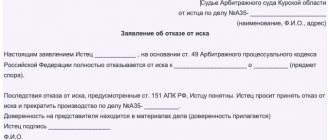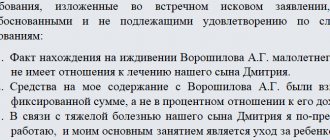1. Third parties who do not make independent claims regarding the subject of the dispute may intervene on the side of the plaintiff or defendant before the court of first instance makes a judicial decision in the case, if it may affect their rights or obligations in relation to one of the parties. They may also be involved in the case at the request of the persons participating in the case, or at the initiative of the court. Third parties who do not make independent claims regarding the subject of the dispute enjoy procedural rights and bear the procedural obligations of the party, with the exception of the right to change the basis or subject of the claim, increase or decrease the amount of claims, abandon the claim, admit the claim or enter into a settlement agreement, as well as to file a counterclaim and demand forced execution of a court decision. A court ruling is issued regarding the entry into the case of third parties who do not make independent claims regarding the subject of the dispute.
2. When a third party enters into the process and does not make independent claims regarding the subject of the dispute, the case is considered in court from the very beginning.
Commentary on Article 43 of the Code of Civil Procedure of the Russian Federation
1. The commented article is devoted to a traditional institution for civil proceedings - the institution of third parties who do not declare independent claims regarding the subject of the dispute (previously, in Article 38 of the Code of Civil Procedure of the RSFSR, these entities were called third parties who do not declare independent claims regarding the subject of the dispute).
Third parties who do not make independent claims regarding the subject of the dispute are understood to be those persons participating in the case who enter the case on the side of the plaintiff or defendant to protect their own interests, since a judicial act in the case may affect their rights and obligations in relation to one of the parties. sides
Accordingly, the following characteristics of a third party who does not make independent claims regarding the subject of the dispute can be identified:
1) absence of an independent claim on the subject of the dispute. This distinguishes the subjects in question from third parties who make independent claims regarding the subject of the dispute (see commentary to Article 42 of the Code of Civil Procedure). The main difference from co-defendants and co-plaintiffs is that third parties who do not make independent claims are not subjects of a controversial material legal relationship;
2) the absence of substantive claims against third parties who do not make independent claims regarding the subject of the dispute, on the part of the plaintiff and third parties who make independent claims regarding the subject of the dispute. An important consequence of this is the impossibility of imposing any substantive legal obligations on third parties or resolving issues directly related to the subjective rights and obligations of third parties (this is unacceptable either on the basis of a court decision or on the basis of a ruling on approval of a settlement agreement);
3) the entry of third parties who do not make independent claims regarding the subject of the dispute into a case already initiated by other entities (this feature does not exclude the possibility for the plaintiff to indicate a third party who does not make independent claims regarding the subject of the dispute directly in the statement of claim);
4) participation of a third party who does not make independent claims regarding the subject of the dispute, in the case on the side of the plaintiff or defendant (if a third party is already participating in the case, making independent claims regarding the subject of the dispute, the option of participating in the case on his side is possible);
5) the existence of a material and legal connection with the person on whose side the third party acts;
6) the purpose of participation is to defend one’s own substantive and legal interests, which can be influenced in a certain way by a judicial act in the case.
Examples of involving third parties in the process who do not make independent claims regarding the subject of the dispute include cases directly established by law.
Paragraph 1 art. 462 of the Civil Code establishes that if a third party, on grounds that arose before the execution of the purchase and sale agreement, brings a claim against the buyer for the seizure of goods, the buyer is obliged to involve the seller in participating in the case, and the seller is obliged to enter into this case on the buyer’s side. Used in para. 1 tbsp. 462 of the Civil Code (as well as in other norms of substantive legislation), the terminology has nothing in common with the procedural institution in question: what is mentioned in paragraph. 1 tbsp. 462 of the Civil Code, the third party will be the plaintiff, the buyer will be the defendant, and the seller will be a third party who does not make independent claims regarding the subject of the dispute, on the defendant’s side.
Article 762 of the Civil Code stipulates that under a contract for design and survey work, the customer is obliged, unless otherwise provided by the contract, to involve the contractor in the case of a claim brought against the customer by a third party in connection with deficiencies in the technical documentation drawn up or survey work performed.
However, most often third parties who do not make independent claims regarding the subject of the dispute are involved in the process in cases where substantive legislation directly allows for the submission of recourse claims (see, for example, paragraph 1 of Article 147, paragraph 3 of Article 399, Art. 640, paragraph 1, paragraph 2, Article 1074, paragraphs 1 - 3, Article 1081 of the Civil Code).
In claims for the protection of honor, dignity and business reputation in cases where information was disseminated by an employee in connection with the performance of professional activities on behalf of the organization in which he works (for example, in a job description), the appropriate defendant is the legal entity whose employee such information was disseminated intelligence. Considering that the consideration of this case may affect the rights and obligations of the employee, the Supreme Court of the Russian Federation recommends involving such an employee in the case as a third party who does not make independent claims regarding the subject of the dispute, on the side of the defendant <1>.
——————————— <1> See paragraph 5 of the Resolution of the Plenum of the Supreme Court of the Russian Federation “On judicial practice in cases of protecting the honor and dignity of citizens, as well as the business reputation of citizens and legal entities.”
The initiators of involving third parties in the process who do not make independent claims regarding the subject of the dispute can be both the persons participating in the case and the court. However, this does not prevent a person who believes that he should be involved in the process as a third party who does not make independent claims regarding the subject of the dispute, from filing a corresponding petition himself.
Can a court refuse to satisfy a petition for the intervention (involvement) of a third party who does not make independent claims regarding the subject of the dispute? The Code of Civil Procedure does not speak directly about this, limiting itself to paragraph 4 of Part 1 of Art. 150 of the Civil Procedure Code indicating that when preparing a case for trial, the court resolves the issue of third parties entering into the case without independent demands regarding the subject of the dispute. However, it is obvious that the court has this authority, since only the court can establish the presence or absence of a material and legal connection between a third party and one of the parties. Accordingly, only the court resolves the issue of the need to involve a third party in the case who does not make independent claims regarding the subject of the dispute.
Chronologically, the possibility of entry into the process for third parties who do not make independent claims regarding the subject of the dispute is limited to the moment of adoption of the judicial act, which ends the consideration of the case in the first instance of the arbitration court (such judicial acts are a court decision, a ruling on leaving the claim without consideration and a ruling on termination proceedings in the case).
Part 1 of the commented article determines the scope of procedural rights of third parties who do not make independent claims regarding the subject of the dispute. In terms of scope, their rights are identical to the rights of the parties (see commentary to Article 35 of the Code of Civil Procedure), with the exception of the rights associated with administrative actions regarding the basis of the claim or the substantive legal requirements themselves.
A completely reasonable innovation is to indicate that third parties who do not make independent claims regarding the subject of the dispute are not entitled to file a counterclaim (this right belongs exclusively to the defendant). In addition, a third party does not have the right to demand forced execution of only a court decision. Does this mean that a third party has the right to demand the execution of judicial acts other than decisions? Of course not. This right is vested only in subjects expressly specified in the law (in relation to the execution of judicial acts, these are the recoverer or the court - part 1 of article 428 of the Code of Civil Procedure, part 1 of article 30 of the Federal Law “On Enforcement Proceedings”).
Paragraph 2 of part 1 of the commented article instructs the court to make an independent determination on the entry into the case of third parties who do not make independent claims regarding the subject of the dispute. Formally and legally, this determination cannot be the object of an independent appeal, since such a possibility is not directly provided for in the Civil Procedure Code, and at the same time, the issuance of such determinations does not prevent the further progress of the case. If for determinations on the entry (involvement) of a third party into the case this approach seems correct, then for determinations about the refusal to enter (involvement) this is hardly reasonable and, we believe, contradicts the constitutional right to judicial protection. For example, the plaintiff brings a claim against the defendant for vindication of an item. Moreover, the defendant previously bought this item from another person (seller). According to the meaning of paragraph. 1 tbsp. 462 of the Civil Code, the defendant in such a situation is obliged to involve the seller in participating in the case, and the seller is obliged to enter into this case on the side of the defendant as a third party who does not make independent claims regarding the subject of the dispute. However, what happens if the court, having refused to satisfy the petition to involve the seller as a third party who does not make independent claims regarding the subject of the dispute, satisfies the plaintiff’s material requirements? In this case, the consequences provided for in paragraph. 2 tbsp. 462 of the Civil Code: “The buyer’s failure to involve the seller in the case releases the seller from liability to the buyer if the seller proves that by taking part in the case, he could have prevented the seizure of the sold goods from the buyer.” As a result, if the seller, already in the framework of a new case regarding a dispute with the buyer, proves that by taking part in the first case, he could have prevented the seizure of the sold goods from the buyer, all adverse consequences associated with the vindication of the goods fall solely on the buyer. At the same time, this would not have happened if the court had granted the request to involve the seller as a third party. Therefore, in the case considered, the right to appeal a ruling to involve a third party in the case is directly related to the substantive resolution of the dispute and therefore cannot be limited.
2. According to Part 2 of the commented article, when a third party enters into the process and does not make independent claims regarding the subject of the dispute, the case is considered in court from the very beginning. This rule is aimed at providing a third party with a real opportunity to use all procedural rights vested in the parties (in terms of presentation, examination of evidence, filing various types of motions, etc.).
3. The Supreme Court of the Russian Federation indicated that a statement about missing the limitation period made by a third party is not a basis for the court to apply a limitation period <1>.
——————————— <1> See paragraph 4 of the Resolution of the Plenum of the Supreme Court of the Russian Federation and the Plenum of the Supreme Arbitration Court of the Russian Federation “On some issues related to the application of the norms of the Civil Code of the Russian Federation on the limitation period.”
4. The current Code of Civil Procedure does not contain a rule allowing the possibility of imposing on an official involved in a case as a third party who does not make independent claims regarding the subject of the dispute, the obligation to compensate the employer for damage caused in connection with payment for the time of forced absence or for the time of performing a lower-paid job. work (previously this provision was contained in Article 39 of the Civil Procedure Code of the RSFSR). We believe that such an approach of the legislator is fully consistent with the principle of discretion and the legal nature of such a subject as a third party who does not make independent claims regarding the subject of the dispute.
Persons who do not declare independent civil procedural requirements
Addition to question No. 956316 dated February 15, 2010 11:57.
Dear lawyers, I still don’t understand this point in this case. I will try to explain everything in order. In order to secure the claim, the judge issued a ruling to seize the inherited property that was transferred to us by law (apartment, house). The arrest was made on November 11, 2008. By this time we had certificates of inheritance rights for all property. My brother and I sold the apartment back in 2007. He lives in another city. We have a Purchase and Sale Agreement. Everything was as it should be, the transaction took place according to the law. And just yesterday I met the owner of the apartment we sold and found out that the bailiffs came to her and seized her with an inventory of her property on the basis of a writ of execution issued in our case. The arrest was imposed on November 11, 2008, indicating my brother as the debtor (although he has not been the owner of the apartment for a year). She filed a claim for the release of property from seizure, wrote a statement to the Chairman of the Court asking him to answer why she was not involved in the process as a third party, so that she had the opportunity to familiarize herself with the case materials and the stated claims, and asked for a copy of the court decision about our business. She also repeatedly approached the judge who is handling our case and asked her to explain to her what was going on, since by law she is the owner of the apartment (a bona fide purchaser)? The judge did not want to talk to her at all and said that she did not impose an arrest and that there was no point in going to her to bother her, since she (the buyer) had nothing to do with our case. HER claim was heard by a different judge. My brother was named as the defendant (debtor). Nobody informed my brother and I about this. The claim was considered without our participation. The case on this claim was dismissed, guided by Article 220 of the Code of Civil Procedure of the Russian Federation in accordance with Article 442 of the Code of Civil Procedure of the Russian Federation. My brother and I only found out about this now, that the buyer of the apartment we sold had to suffer so much. If only we had known about this earlier, we would have reflected all this in cassation complaints, and at the trial we would have filed a counterclaim or come up with something else. Wasn’t the court obliged to call our buyer as a third party to participate in the process, to notify my brother and me? After all, the court decision handed to us contains the address of the apartment we sold, and we are entrusted with the obligation to pay the plaintiff compensation for the cost of the apartment sold. The notary is entrusted with the obligation to issue new certificates of the right to inheritance, taking into account the third late heir, 1/3 of a share each, recognizing previously issued certificates of the right to inheritance as invalid. The notary was also not involved in the process, as a third party who did not make independent claims. The court did not consider the validity of the transactions and did not involve third parties. The Cassation Board leaves the court's decision unchanged, justifying the judge's decisions, guided by Article 1154, paragraph 1; Art. 1155 clause 1, clause 3; Article 1105 clause 1 of the Code of Civil Procedure of the Russian Federation. At the box office. The definition does not say a word about our details, about the witnesses who confirmed the content of the telephone conversation (my brother and I wrote about all this in the cash register. Complaints). It was as if we had not proven at all that we had properly reported the death of our father. I get the impression that the cassation board did not really read the materials of the case. Please help me figure this out. Tell me, if possible, what points are best reflected in the supervisory complaint so that they do not refuse to consider it. I look forward to your advice.
Irina.










